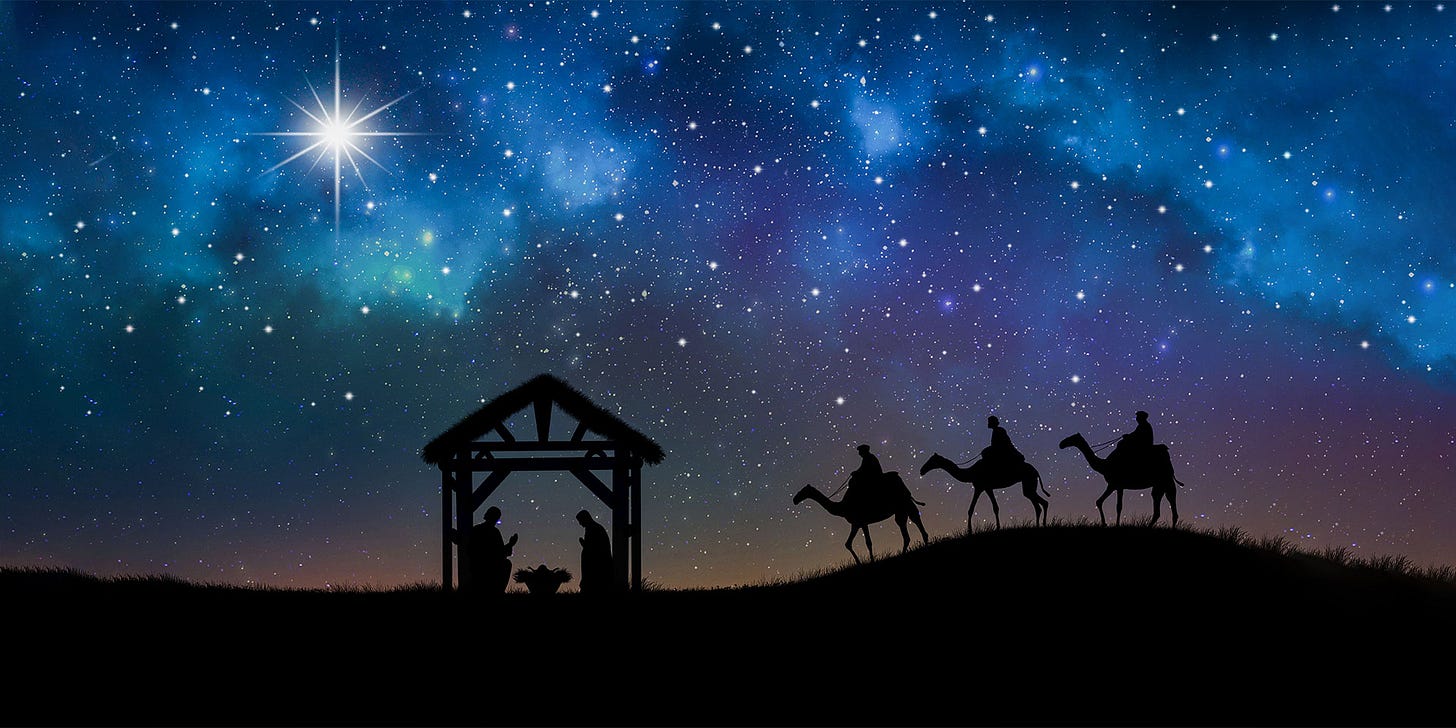O, Come Let Us Adore Him
Three Point Essay #40 | Christmas, Religion & Evolution, Symbolism
Jeff Sullivan’s Three Pointers
I. 3 Ships Come Sailing In
To my good-looking subscribers:
Have a holly, jolly Christmas. Why can’t every day be like Christmas? Not a blue Christmas, but a white one. It’s really the most wonderful time of the year, when Santa Claus comes to town and brings joy to the world. And away in a manger, jingle bells are rocking and Rudolph is running while the little drummer boy steps into Christmas and watches the snow fall for forever and ever. I must confess, even though I should be playing in the winter snow, I’ll be under the mistletoe. I just want to wish you all a merry Christmas, from the bottom of my heart.
II. Existence
Who is the bigger fool, the one who takes religion literally or the one who sees no value in it?
When I was younger, I always wondered about the other heavens. You know, for the other religions. The ones besides Christianity. Despite this curiosity I still went to church every once in a while and prayed to my cross, but usually in a selfish way “please let me score in the game tonight.”
I could never ignore the fact that thousands of other belief systems exist. And have existed for thousands of years. Growing up, the more I read history, the more I questioned everything, the more disillusioned I became with religion in general.
By using logic, it was impossible to think that one religion is magically 'right'. Or you can ignore logic and take ya pick! Is it the religion of the ancient Greeks? Romans? Egyptians? Persians? Vikings? Native Americans? Aztecs? Incas? Maya? Chinese? Japanese? Is it Christianity? Islam? Judaism? Hinduism? Surely it’s the one you got indoctrinated into as a child and is deeply connected with your culture!
This skepticism only grew stronger when I started attending a catholic high school. The best stand up-comedy specials couldn't compete with some days in Theology class. It's absurdity made me even more curious about other worldviews.
But it’s worth noting that Christianity is unique in many senses, one being that it’s the backbone of Western Civilization, the freest and wealthiest societies ever. As historian Niall Ferguson said “atheism is not a good operating system for a society” and that “all attempts to build societies around atheism have produced terrible horrors, (think Soviet Union)” Aside: Ferguson also talks about religious observance vs. outright belief. This is where I and most of my peers seem to be at. That is, I know very few people who identify as religious, but basically all still get together with their family on Christmas and Easter, and go to a church when someone gets married or dies. And many wear a cross around their necks. It’s still our society's operating system—we observe its traditions and important basic teachings on how to be a good person.
Anyways, from the oversimplified, religious or not religious point of view, I became very unreligious. Especially after my catholic high school days. I did a deep dive into scientific views of the universe. I obsessed over understanding evolution.
Evolution gives us the best explanation for why human civilization is the way it is and why we behave how we behave. (My favorite books that take an evolutionary perspective of history are Sapiens: A Brief History of Humankind by Yuval Noah Harari, The Ape That Understood the Universe by Steve Stuart Williams, The Lessons of History by Will Durant, and of course On the Origin of Species by Charles Darwin.)
In Sapiens, Harari explains Religion as man-made stories. And that the utility in it is that “large numbers of strangers can cooperate successfully by believing in common myths.” As our ancestors created more complex myths, world religions were born, enabling further wide-scale organization. Here’s an example:
Imagine you’re the chief of an American tribe. You have ambitions to unite the tribes around you who’ve been getting into fights. You need an idea, a symbol rather, that could persuade the people to come together. One day you develop a master plan to invent the rain god—Aquasavior. Without rain, none of your crops would grow, and everyone would starve. You craft a story that the ever-important rain god appeared to an old wise man of your tribe. Aquasavior tells the old wise man that the people of your region are destined for greatness, peace, happiness, and even an afterlife if they follow certain rules and principles. But they must spread the good word. They must get new believers in the story and commandments of the rain god, for him to continue blessing them with water and abundance. You recruit missionaries and reveal this story to the population. Time goes on, generations pass, and you get convert after convert to the faith. People who otherwise wouldn’t get along for any number of reasons are now united in love and harmony by an agreement that Aquasavior is awesome. Your few united tribes are now a growing empire thanks to people agreeing on these values and beliefs. You created jobs by building schools and temples dedicated to Aquasavior. In battle, your ever-growing army full of Aquasavior fanatics are emboldened by their belief that they have god on their side. Wins across the board, all thanks to a uniting myth. In different and much more complicated ways, this is how religions formed and spread throughout history.
But that can’t be all it is.
There’s a great idea from Nassim Taleb that “asking Science to explain life and vital matters is equivalent to asking a grammarian to explain poetry.” In other words, life is so beautiful and strange that to only view it through the lens of Science and ‘reason’ is a tragedy.
For example, the creation of uniting myths idea still doesn’t explain how we even have the capacity to do that in the first place—how we have the ability to feel, be aware, and be creative. How we have consciousness is something no one has ever figured out. Even Scientists agree. As evolutionary psychologist Steve Stuart Williams describes “evolutionary theory doesn’t answer the deeper question of why matter has the capacity to become conscious when it’s organized and functioning in a particular way.”
Is the fact that we have consciousness proof of God?
Because it feels like God is real when I’m in a flow state and forget about everything else in the world. It feels like God is real when I’m listening to music and get goosebumps while all the hair on my body stands up. It feels like God is real when I lock eyes with a gorgeous woman and she smiles. It feels like God is real when I have an ‘aha’ moment. It feels like God is real when I want to smash my head through a wall because I’m so excited about something. It feels like God is real when I experience something awe-inspiring in nature. It feels like God is real when I think about my childhood and my family.
There's a ‘rational’ part of me that tells me life is just a cosmic accident and nothing more.
But this belief that there’s something more than we can see or comprehend sticks with me. What does that exactly mean? Don’t know. But this way of thinking serves me well. It’s like how believing I’m lucky serves me well. And from a mental health perspective, it’s been better to believe in something, God, a higher power, spiritual realm, anything, than to be cynical and nihilistic. Not a blind belief and ignorance of evolution, history, and science. But a hopeful faith.
III. 3
I’m playing basketball at the rec center and my brother Dave walks in.
Wanting to make him laugh, I hand him my phone and tell him to start recording. I chuck a 3-quarter court shot. It misses. I chuck another one, misses again.
At this point Dave shakes his head wondering why I’m doing this. I tell him to take one more video.
“Let me try something” I look at the camera and say “I can do all things through Christ who strengthens me.” I take the long shot. Swish. I go crazy and sprint out of the gym while Dave is laughing.
 Tiktok failed to load.
Tiktok failed to load.Enable 3rd party cookies or use another browser
As I recall, Jesus is part of the Holy Trinity: the unity of the father, son, and holy spirit—three divine beings as one God. On the 3rd try of a 3 pointer from 3 quarter court the shot went in, after saying a Bible verse about Jesus.
Merry Christmas.



